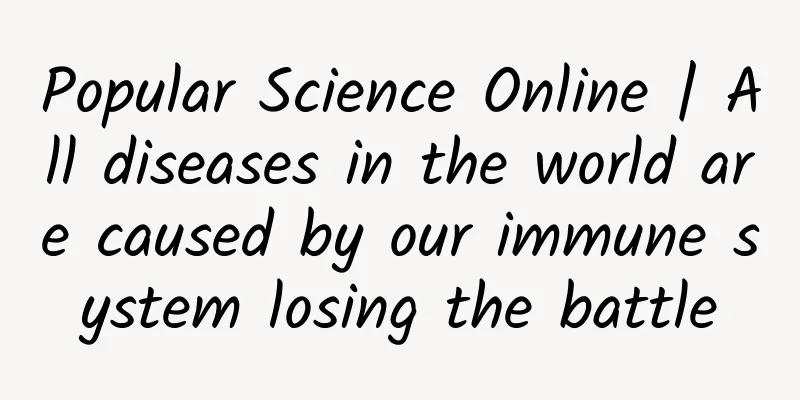Popular Science Online | All diseases in the world are caused by our immune system losing the battle

|
Modern people believe in chemical drugs and think that only chemical drugs can cure diseases, but we ignore our own resistance: our immune system. When we come into this world, we bring the world's "best doctor" - the human immune system . It is this doctor who helps us resist the invasion of foreign diseases. Without it, human life will be in danger. All diseases in the world are the result of the immune system losing the battle. In ancient times, the biggest problem our ancestors faced was how to avoid becoming food for large animals. With the development of modern technology, these problems no longer threaten human life and death. At the same time, another killer of humans has emerged over time - disease. But diseases cannot easily defeat humans, because we also have a powerful army to protect our health, that is the immune system . Skin and mucous membranes are our first line of defense , the walls and moats that we use to protect ourselves. Most bacteria and viruses that invade the human body are blocked by the skin. If they want to invade the human body through the nose, mucus will wrap them up, causing an itchy feeling, so we sneeze and the virus is expelled from the body. However, when the skin is damaged, bacteria and viruses can easily take advantage of the opportunity to enter**, but we still have a second line of defense - macrophages**. Macrophages can easily swallow up to hundreds of bacteria and viruses, and they also secrete signals to allow water to penetrate the blood vessel wall, making the battle easier. If the macrophages can't keep up the fight, they'll call in neutrophils , which are powerful enough to kill invaders easily, but they only live about five days. Most battles end at the second line of defense, but many vicious diseases require more powerful killing methods because we also have the third line of defense - immune T cells and B cells. When macrophages find that victory is hopeless, they will look for the most powerful signalman - DC cells . DC cells decide which special forces to activate by observing the battlefield. If the battle is in the blood, DC cells will activate B cells. DC cells transmit the information about bacteria or viruses, which we often call antigen information, to B cells, and B cells will then produce a magical substance - antibodies. Antibodies will specifically bind to antigens, so that the virus loses its ability to make people sick, and then it will be eaten by our macrophages. The immune process led by B cells is called humoral immunity. When viruses or bacteria invade cells, our special forces T cells are needed to play a role. T cells can directly lyse the invaded cells, leaving the virus nowhere to hide. The immune process led by T cells mainly occurs between cells, so it is called cellular immunity. When B cells and T cells finish their battle, they will retain the memory of the invading virus or bacteria. In this way, the next time the same virus or bacteria invades, they can quickly produce an immune response. These retained cells are called memory cells. Our skin, mucous membranes and macrophages constitute the first and second lines of defense, which are called non-specific immunity because they target most bacteria and viruses. However, humoral immunity led by B cells and cellular immunity led by T cells can accurately kill viruses and bacteria, so they are called specific immunity. The immune system relies on three lines of defense and two major systems to protect our health , which is the reason why we can live and work healthily and happily every day surrounded by countless viruses and bacteria. Store immune cells as early as possible Throughout the journey of life, as we age, our immunity and immune cells will continue to decline. As we age, our bodies can no longer “resist infection” as they once did, and weakened immunity causes our health to deteriorate. At the age of 20, the number and activity of immune cells reach their peak; At 40, the activity and number of immune cells decline rapidly, remaining only half of that at 20 years old; At the age of 70, the activity and number of immune cells are only 1/10 of those at the age of 20. The number and quality of immune cells are declining every day! The immune cells are at their strongest when the human body reaches adulthood, around 18 to 20 years old . After that, they begin to decline. Middle-aged people, when experiencing a midlife crisis, are likely to have weakened immune functions, and they particularly need to improve their own immune capabilities through diet, exercise, and other means. If you overuse your body without a healthy lifestyle, it's like overusing a machine without maintenance or overhauling it. Therefore, additional cell supplementation may be a better option to protect healthy functions at this time . END |
Recommend
Online Love Saint Group 38 Dating - Attraction - Chatting - Temptation
If you feel that women's tempers are always i...
Example analysis: “Super user” data operation rules!
The article takes NetEase Yanxuan as an example t...
[Grain Policy of a Great Country] Seafood Factory in the Deep Sea: Digital Technology Continues to “Charge” the Blue Granary
When the granaries are full, the country is at pe...
Fun Questions | What is the uneven structure above the mouth?
What is the uneven structure above the mouth? Pal...
I missed Steve Jobs and the first iPhone, but luckily I didn't miss you ten years later
There are many ways to live. Different people hav...
Android mobile live broadcast project development overview analysis
1. Description In the past two years, the live br...
MSN's farewell to China is not a pity; its decline is inevitable
Recently, Microsoft announced via email that the ...
Android P enters public beta, these 15 changes are worth noting
At the I/O 2018 conference that just ended, we sa...
Changes in NCAP rating standards force changes in automotive technology
NCAP—New Car Assessment Program, by simulating var...
Xiaofei's live streaming sales account creation course, learn live streaming from the underlying logic
Xiaofei's live streaming sales account creati...
What is shore power? The quality of port air is actually related to it!
my country is a major port country in the world. ...
Take stock of online marketing and promotion channels! One picture is enough, I collected it~~
Introduction: This article divides the nine commo...
Chocolate + soda =?
One day, I was eating chocolate and drinking soda...
3+7, how come it equals 8?
Review expert: Li Xianhong, national second-level...
Mysterious ultra-high energy gamma rays, the oldest light in the universe, what is the connection between the two?
Ultra-high-energy gamma rays may reveal how the u...









